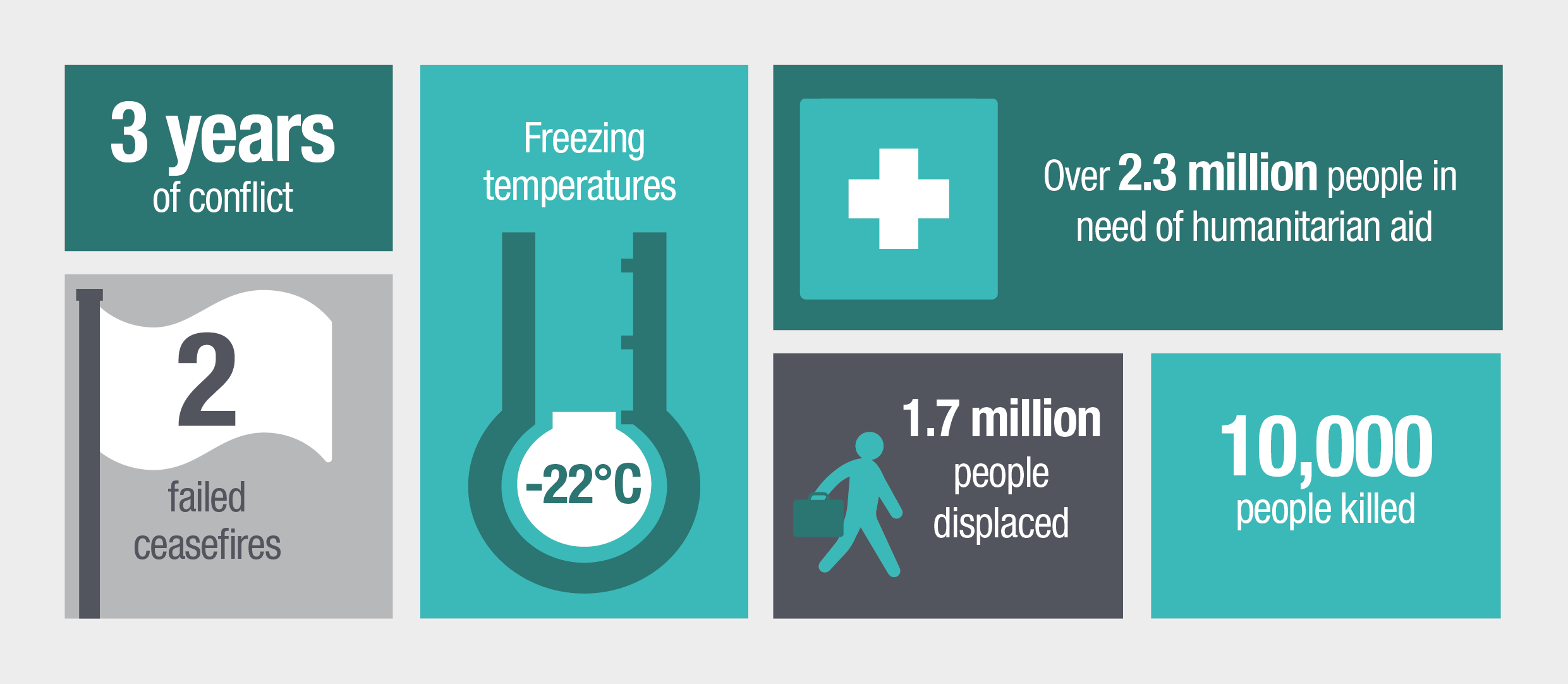Ukraine made headlines last week following pro-Russian separatists’ advance on the eastern town of Avdiivka, a city on the front line home to 22,000 people. The renewed fighting and intense shelling have forced many to start looking for ways to evacuate.
The country is now on a brink of yet another humanitarian catastrophe. Three years since the start of the conflict, 1.7 million people have already been displaced internally and almost 10,000 are dead.
Despite the temporary ceasefire agreement signed in February 2015, commonly known as Minsk II, there are hundreds of reported violations and no political solution in sight.
Millions in need of aid – many of them out of humanitarians’ reach
Nine months ago when I was in Donbass, the eastern Ukrainian region affected by the conflict, the conflict was defined as ‘frozen’. Neither party was advancing its position at the front line, but shelling continued to cause deaths, injuries and displacement.
As the war continues for the third year, fewer humanitarian organisations are able to operate where aid is needed most: at the frontline and in the separatist-controlled territories. Shelling has left civilians without housing; damaged water and gas pipes has left them without access to water. All this in temperatures as low as -22°C.
When the fighting broke out in 2014, local groups of civilians organised themselves in volunteer groups to evacuate civilians from towns and villages under active shelling, despite putting themselves at great risk. Last week’s events in Avdiivka have forced them to risk their lives again and restart their social media campaigns to find fuel, cars and start evacuating the victims of the renewed fighting.
No political solution in sight, but governments should press for humanitarian access
Following increased fighting in eastern Ukraine in 2014 after pro-Russian separatists took power and proclaimed two independent republics, France, Germany, Russia and Ukraine came together to negotiate a solution to the conflict. Minsk I, the first cessation of hostility, only lasted a few months. Minsk II called for demilitarising the frontline in 2015, but it has also been greatly undermined by the repeated violations.
Commentators never believed that the ceasefire agreement was going to work. Many experts still see Minsk as a process controlled by Russia with the aim to freeze – not resolve – yet another conflict in eastern Europe. There is currently no indication that a political solution to the crisis is possible.
In this context, there are two priorities. Western governments and Russia must influence parties to the conflict to allow safe passage of civilians trying to flee. They must also provide access to humanitarian organisations. European Union chief Donald Tusk has already called on Russia to honour the ceasefire and use its influence over the pro-Russian separatists. United States Ambassador to the United Nations Nikki Haley has also stated the situation in Eastern Ukraine demands ‘clear and strong condemnation of Russian actions.’ Western governments must follow this with additional calls.
For example, in line with the Minsk agreements France and Germany should raise the costs of ceasefire violations through increasing the current sanctions regime. Meanwhile the rest of the European Union should continue applying and increasing sanctions on Russia. The UK and the US should also join others in sending strong signals to Russia: that there are consequences for its support to pro-Russian separatists in eastern Ukraine, for ceasefire violations, and for causing humanitarian suffering.
As Ukrainians both bear the brunt of this rapidly deteriorating conflict and take it upon themselves to lead evacuation efforts, governments must do all they can to protect and support them. This cannot become another forgotten conflict.

